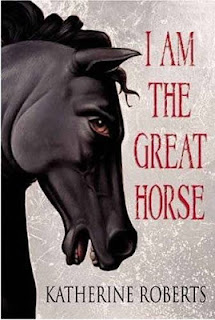Alexander the Great Rides Again at the British Library -- Katherine Roberts
A new exhibition starts today at the British Library: Alexander the Great: the Making of a Myth. From now until 19th February 2023, you can explore the blurred lines between history and myth to discover how the young prince of Macedonia, who tamed a horse grown men were afraid to ride, became known across the ancient world as 'Great' Alexander.
I'm delighted that my novel straight from that untamed horse's mouth - I am the Great Horse (Chicken House, 2007) - is included as one of the exhibits. This book re-tells history through the eyes of Alexander the Great's faithful horse Bucephalas, aiming to be true to the known facts about his life while incorporating some of the myths that grew up around his name, such as his encounter with the legendary Amazon queen. Although published originally for a young audience on the Chicken House/Scholastic list, this novel has since found a readership across all generations of horse and history fans and is now available in both paperback and ebook format, as well as secondhand in its original US hardcover edition... if you can still find one!
 |
| I am the Great Horse (Scholastic US first edition, 2006) |
 |
| Bucephalas |
To remind me of their names and characters, I drew portraits of all the horses in Bucephalas' herd and still have the originals in an album, along with some of the original artwork for the book. The horses I invented for the story were ridden by Alexander's closest friends and generals so they all had a part to play, even the captured Persian horse Zoroaster, who joined the army after Alexander defeated the Persian King Darius at their first battle and took his family hostage. They would have been real horses in history, of course, but we don't know much about them. Bucephalas, who had a reputation for being unrideable when the ten year old Alexander famously tamed him by turning him into the sun so that he would not be scared of his shadow, stole most of the limelight.
My horse pictures did not make it into the novel, however artist Brian Sanders transformed my sketched map of Alexander and Bucephalas' epic journey from Macedonia to India into a beautifully coloured work of art that made it into the paperback version:
 |
| Bucephalas' Hoofprints - map (c) Brian Sanders |
I also created a horse-human dictionary so that Bucephalas could have a suitably horsey voice of his own. This involved substituting human expressions and mannerisms with the equine equivalent. For example, when Alexander challenged someone to a fight, Bucephalas would call this 'making himself huge', in the same way an animal (including a horse) makes itself appear bigger when threatened by another. If you've seen Oliver Stone's epic film Alexander, perhaps the best example of this is towards the end, when Alexander and Bucephalas challenge a war elephant ridden by the Indian prince Porus... both animals rear up at each other, the horse in the film dancing on its hind legs in an effort to make itself appear as huge as the rearing elephant. According to an interview on the DVD version, apparently even the director Oliver Stone did not expect that.
There's much more about the writing of I am the Great Horse on my website... just follow the links at the bottom of the 'Great Horse Books' page to read those posts that interest you!
*
Katherine Roberts writes fantasy and historical fiction for younger readers, often featuring horses or their mythical cousins such as unicorns.
* I am the Great Horse ebook SPECIAL OFFER only 99p/99c *
 |
| I am the Great Horse |
Comments